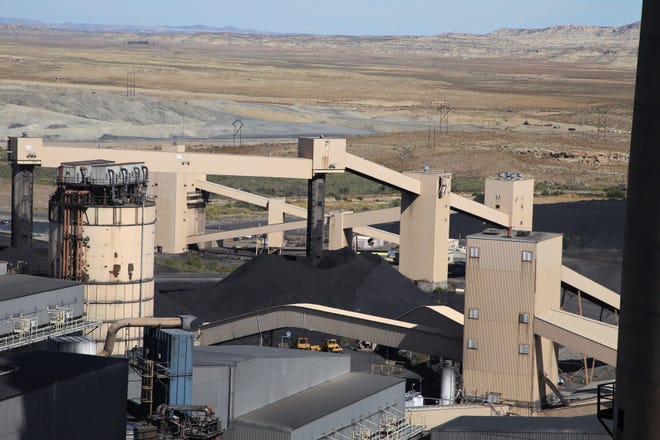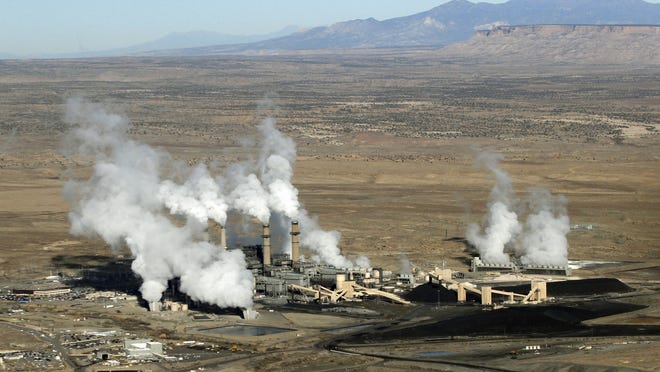Environmental groups say EIS is needed about the SJGS carbon capture project's impacts
Proposed study could substantially delay Enchant Energy's proposed carbon capture project
A group of nine environmental organizations sent a letter to the Department of Energy's secretary requesting the initiation of a multi-agency environmental impact statement looking at Enchant Energy’s proposal to retrofit the San Juan Generating Station with carbon capture technology.
If an EIS is required, it would delay the project substantially, but the environmental advocates point out that similar projects have gone through the process.
The carbon capture retrofit will prevent the loss of tax revenue in San Juan County and preserve jobs at the coal mine and power plant. However, critics say it is an expensive project and it is unclear who will buy the electricity if it is successful.
“Enchant Energy is actively working on securing the environmental and other permits needed for the project to add carbon capture at San Juan Generating Station with the appropriate federal, state, and local agencies,” said company CEO Cindy Crane in a statement emailed to NM Political Report. “This project directly addresses the need for sustainable, reliable, low-carbon power generation necessary to meet climate change emissions goals. In addition, the project will create needed jobs in northwest New Mexico that are so important to that region’s economic success.”

Construction must begin by the end of 2025 for the project to be eligible for the 45Q tax credits. These tax credits provide $35 per ton of carbon captured and used in oil and gas production and $50 per ton of carbon injected underground for permanent storage.
The tax credits have been a key part of Enchant Energy’s strategy since it proposed the project.
Enchant Energy’s current timeline shows the company taking ownership of the power plant next year and having it operational with the carbon capture technology by 2024.
An EIS could delay that process and may take years to complete. An environmental assessment, on the other hand, could be completed in a matter of months, but Mike Eisenfeld, climate and energy program manager for San Juan Citizens Alliance, said this would have less public involvement and would be inconsistent with the practice for other carbon capture projects.
He pointed to past carbon capture projects that have all required environmental impact statements.
If the San Juan Generating Station retrofit is successful, it will be one of the largest carbon capture projects in the world and it will be the largest one that uses coal-fired generation.
There is currently only one operational coal-fired power plant that uses carbon capture technology, the Boundary Dam Power Plant in Canada. In the past, the Petra Nova project in Texas used carbon capture technology on the W.A. Parish coal-fired power plant. But that project was mothballed indefinitely last year.
Neither Boundary Dam nor the Petra Nova project are as large as the San Juan project. However, the Petra Nova project went through the EIS process, which started in 2011 and had a record of decision released in 2013.
In addition to San Juan Citizens Alliance, the other groups that have signed the letter are Diné CARE, Tó Nizhóní Ání, NAVA Education Project, National Parks Conservation Association, Western Environmental Law Center, 350 New Mexico, Sierra Club Rio Grande Chapter and Center for Biological Diversity.
The letter states that the potential environmental impacts from the federal funding that Enchant Energy has already received and the loans it could receive is “enormous and currently unvetted.” In the letter, the groups highlight that it will require the complete redesign of the power plant. If successful, the project will extend the life of the power plant.

While the carbon capture technology will significantly reduce the emissions from the San Juan Generating Station, there will continue to be associated air pollution. This includes methane emissions from the neighboring San Juan Mine, which provides coal to the power plant.
Additionally, Enchant Energy is working with New Mexico Institute of Mining and Technology in hopes of developing a category six injection well, which will be used to inject carbon dioxide into deep geologic formations.
Carbon dioxide can only be stored in two types of wells: a category six well or a category two well. Category two wells are generally used for storage of produced water or other fluids from oil and gas extraction. There are no category six wells in New Mexico.
The other option for the carbon is to send it through a pipeline to the Permian Basin for use in enhanced oil recovery. This involves pumping the carbon dioxide into an oil well to force the oil out.
To do that, Enchant Energy would have to build a pipeline that would transport the carbon dioxide from the power plant to the nearby Cortez pipeline, which is operated by Kinder Morgan and transports carbon dioxide from Cortez, Colorado, to the Permian Basin.
If Enchant Energy is not successful, the San Juan Generating Station will likely close next summer. Layoffs have already begun at San Juan Mine in preparation for that closure.
The mine’s owner, Westmoreland Coal, will have to decide whether to seal the mine this year or to keep a small number of staff to perform operations and maintenance in hopes that Enchant Energy can be successful and mining operations will someday return.
Check out the nonprofit NM Political Report's website for more news about New Mexico, https://nmpoliticalreport.com/